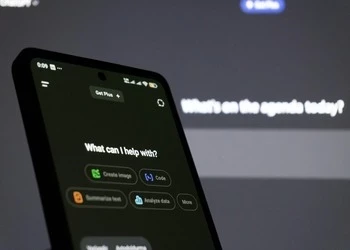Virgin Money implements conversational banking
Find out about how Virgin Money is applying conversational banking to improve customer experience
Add bookmark
Conversational banking, which leverages artificial intelligence (AI) to facilitate real-time communication with banking customers in a natural, human-like way, is gaining popularity among customer experience (CX) leaders. This form of digital banking involves natural language processing (NLP) and can be delivered through various channels, including apps, websites and instant messaging.

Don't miss any news, updates or insider tips from CX Network by getting them delivered to your inbox. Sign up to our newsletter and join our community of experts.
Virgin Money applies conversational banking to provide more efficient customer support. Recently, Laura MacLeod, digital product strategy senior manager at Virgin Money, shared the bank's approach and lessons learned at the All Access: Future Contact Centers 2025 webinar series.
Start small with conversational banking
In November 2022, MacLeod and her team started small. They initially focused on credit cards because it was a "ring-fenced part of the business," she said. They observed and reviewed conversational banking in a controlled environment.
"We already had chatbots, but not in a conversational, natural language style," added MacLeod. "As we evolved, we expanded from credit card customers to mobile banking customers, upgrading chatbots into virtual assistants and broadening the product approach. This allowed us to elevate from a commercial, customer-holding place for credit cards into customer services and operations. AI became a channel for the bank, and as customers used it more, we could apply AI in different ways across servicing, customer services and operations, making it a good fit for a broader platform."
Managing change management
Transitioning into applying this AI to a broader swath of the business was a challenge for all the obvious reasons. One of the biggest obstacles is getting the humans on board through transformation.
"AI often brings curiosity and fear because it's an unknown," said MacLeod. "The data spoke for itself. Customers used our virtual assistant 24/7, which suited their personal circumstances. It became a channel of choice for digitally inclined customers. Colleagues have been open to using the virtual assistant as a support mechanism for simpler queries. The speed and ease of use are key benefits. This helped us move quickly and broaden the scope of tools available to both colleagues and customers."
MacLeod and her team implemented a transformation plan to get people comfortable with conversational banking. They received feedback and gave people time to adjust to different elements.
"Change management is challenging and personal," said MacLeod. "We listen to concerns and recognize that perceptions of AI can change with the news cycle. Our team includes many from customer services, giving us valuable insight. We do a lot of internal showcasing and agile playbacks, allowing the wider team to see what's coming and provide input. We deliver value quickly, every five and a half working days last quarter. Internal communications and feedback are crucial, as is outreach to younger generations through STEM events to address AI fears early."
Building trust
Customers are using live chat for sensitive issues, including fraud. Yet, the bank has instilled a certain level of confidence in customers. MacLeod credits the consistency of the technology. Over time, people have grown more accepting and comfortable with it. Also, Virgin Money has written guidelines on ethical AI.
"Transparency is essential," said MacLeod. "Customers must know when they're dealing with AI versus a human. Our bots can explain what AI is and how it works, and we're adding more features to make this clear. Internally, we ensure a human-in-the-loop for content checks. We want customers and colleagues to understand the inner workings of AI and be aware of when it's being used."
In line with this dedication to ethics, Virgin Money has put an emphasis on the role of people in this digital transformation. This is how MacLeod described the company's guiding philosophy on managing this effort:
"The virtual assistant is part of the team, not separate. We expect customers to treat the virtual assistant as they would our colleagues. For example, if someone swears at the assistant, we don't allow it, just as we wouldn't tolerate that toward colleagues. Colleagues see the assistant as an extension of their team, helping with simpler queries and providing a warm handover for more complex issues. The guiding principles for developing the assistant are the same as for training colleagues: use simple language and ensure consistency in customer experience."
Assessing success
Throughout this process, Virgin Money has paid attention to what customers - and their own people - think about conversational banking. By slowly expanding the program and offerings, the bank was able to take a test-and-learn approach. The team was unafraid to change course when necessary.
"Early on, we considered expanding to channels like Facebook Messenger or WhatsApp, but customers didn't want that. They preferred to keep banking separate from personal messaging," said MacLeod. "This feedback shaped our roadmap. The key is understanding customer desires and ensuring they are integral to our development process. Proofs of concept help both customers and internal colleagues get comfortable with new features, and we plan to do even more of this."
One of the interesting patterns that companies leveraging AI are reporting is that contact volume increases after they implement these digital transformations. In the past, reducing volume was the goal. But the technology makes it possible to communicate with more people faster.
"Many customers find it easier to type a question than to self-serve in the app," said MacLeod. "The assistant is available 24/7, so customers can get help at any time, even in the middle of the night. The assistant often deep-links customers into the app to continue their journey, fulfilling their needs quickly."
What's next for conversational banking?
The results are positive, so far. Adding a virtual assistant as a front-facing concierge has shifted 30 to 40 percent of conversations from colleagues to the assistant, said MacLeod. The team has deployed Microsoft Dynamics, a low-code, no-code platform that allows for flexibility, said MacLeod.
"This has led to operational improvements, reduced call volumes and given colleagues more time for complex queries," she said. "The assistant also helps break down digital barriers for customers of all ages, broadening access to digital services."
Predictions about the future with AI abound. But pinning down what comes next isn't easy.
"The unknown excites me. AI is a black box, and we don't know exactly what the future holds," said MacLeod. "We build our roadmap with time to explore new developments. It's important to keep both colleagues and customers at the heart of what we do, ensuring both benefit from new tools and experiences. The next 12 to 24 months will be action-packed and exciting as technology continues to evolve."
Quick links:
- Michael Kors applies AI to improve KPIs
- Spirit Airlines adopts AI-powered self-service
- Verizon bets on AI agents to transform CX






















